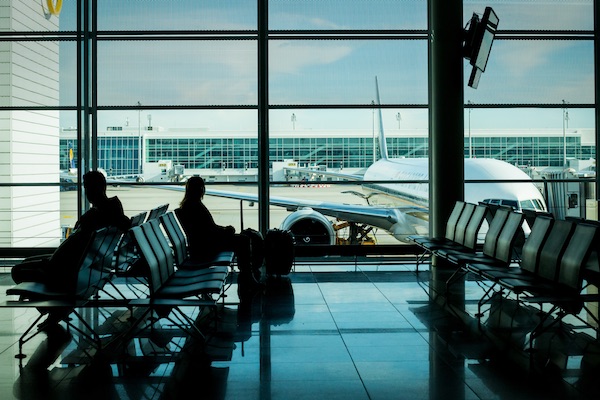A few weeks ago I asked what you’re saving your points and miles for and probably the number one item on my travel list is going back to Calais and staying there for at least a month. In case you missed it, back in July, I traveled briefly to Thessaloniki and Calais in order to volunteer in the refugee camps.
I was only in Thessaloniki for a couple of days because things were so unorganized, so I decided to head to Calais instead to volunteer with Help Refugees/L’Auberge des Migrants.

This ended up being a great decision. I spent a week there, having the best time working alongside the most kind and generous people I’ve ever met. I would have loved to stay longer.
Unfortunately, I had to get back home in order to maximize the 5% cash back bonus on the Wells Fargo card. That’s life for us manufactured spenders. My card got shut down shortly after, and I’ve been planning on going back to Calais ever since.
The only thing standing in the way of me traveling to Calais for a longer period is how I’m going to fund it. I don’t want to spend money on this trip. My thinking is, if it’s going to cost $1,000+ per month, I might as well just donate that cash to one of the aid organizations that are out there.
Why waste money on travel costs if it can go directly towards the people I’m trying to help? So really, the only way I’ll go is if I can cover the trip on points and miles.
I already have enough miles to cover the roundtrip airfare, so all that’s left is lodging. Last time, I stayed at the Ibis Calais (not recommended – stay tuned for a review) and the Holiday Inn Calais.
The Holiday Inn has a nice location in the city center, but the hotel itself isn’t in the best shape. Plus, I don’t think it’s prudent to spend $3,000+/285,000 Arrival miles per month on hotel stays. Even if the out-of-pocket cost is cut in half with Arrival miles, it’s not a prudent choice for long-term accommodations.
There’s also Airbnb, but I find the concept of living in someone’s house really uncomfortable. I stayed at an Airbnb rental in Bali and it made me realize staying in a stranger’s house isn’t my cup of tea.
I’m not ruling this out, because there are some good, affordable places in Calais that will cost as little as $40 per night without a roommate. I will leave town on the occasional weekend to travel to other cities.
I’ll likely be able to redeem as few as 76,000 Arrival Miles per month for an apartment and some hotel points for weekends in neighboring countries. This would involve just $40,000 worth of manufactured spending on the Barclay Arrival Plus Card, which will be a piece of cake.
The most prudent option is probably staying at the Auberge Jeunesse Calais Youth Hostel, which describes its accommodations as “agreeable”.
A single room costs 32 Euros for the first night, decreasing to 30.20 Euros thereafter. They even offer reduced rates of 17 Euro per night for long-term volunteers staying in triple rooms. This option will set me back around $570 per month or $1,020 for a single room.
I may be able to redeem Arrival Miles to cover the cost. The rooms don’t look particularly inviting and it is quite a way from the nearest bus stop. But because other volunteers will be staying here, it will be easier to coordinate rides to the warehouse and camp. My only other concern is the cleanliness of the space, which has some mixed reviews on Tripadvisor.
Now that the Wells Fargo card is out of the picture, I just have the 3% cash back bonus on my Discover It Miles card to worry about. Along with funding all those upcoming trips I mentioned before.
My manufactured spending routine has become as efficient as ever, so I feel like taking some time off wouldn’t be so bad. I could continue to place gift card orders online and then have my brother or sister liquidate them for me. I don’t feel entirely comfortable with that option. Once I work out how to keep my manufactured spending going from abroad, I can finalize my plans.
Interested in volunteering in either Calais or Greece? I’ll soon have a post about where to go, how to get there, where to stay, and who to volunteer with. If you’d like to donate to one of the many organizations who are on the ground, I recommend the following:
- Help Refugees/L’Auberge des Migrants
- Al Khair Foundation
- Calais Women’s and Children’s Center
- Jungle Books
Have you used points and miles to cover long-term travel expenses? How did you pull it off?


So no problem getting the 1.5 doubled at the end of the first year doing ms?
We’ll see in February!
I want to commend you for going and helping out. It takes a huge, huge heart to do this. This speaks 100x about you more than any of the mfg. spending. I pray you are blessed so much for doing this.
I appreciate the kind words John. Thank you!
Mass immigration can destabilize Europe and it’s just a drop in the ocean in the world of poverty, it’s a huge mistake, of course I agree that we have to help war refugees but this is the worst possible way.
This is very informative video https://youtu.be/LPjzfGChGlE
Helping in France is simply wrong. It only enables an endless loop that has no solution. Ariana needs to go to Africa, India, or wherever the help is truly needed and apply her skills there. The people in third world countries need clean water, build infrastructure, and to be shown many other skills where Ariana’s youth, energy, and enthusiasm will be best applied. Once these countries build up, their population will not need help in the Jungle of Calais. The population will be happy at home. Most people are happiest at home. It is very difficult to emigrate. On top of that, they will never fit into France or for that sake their dream home of best social care Great Britain. This despair is not worth it. Reasonable thinkers will come to that conclusion and will go to the source, directly where the help is needed most.
Most people are happiest at home, except when their home is being bombed and their lives are in constant danger. Until the conflict in these countries is resolved (and I’m not in a position to resolve them, no matter how much youth and enthusiasm I have), I will continue to help people in whatever way I can. In Calais, I can offer friendship and my services as a translator. I commend anyone who is volunteering in Africa and India. But we can’t turn our backs on fellow human beings who are undertaking a harrowing journey through dangerous territories to get to a safe place. The people who are actually doing something about the situation (and I’m referring to the selfless volunteers who are the only ones caring for the camp residents and trying to resolve their asylum claims legally) understand that we can’t let fellow human beings suffer and starve because they may not “fit in” with us. As for their dreams of social care – most of the refugees I met wanted to reunite with family in the UK and pursue educational and business opportunities that are scarce elsewhere in Europe. In fact, dozens of camp residents have set up businesses right there in The Jungle, which is incredible considering their circumstances and the trauma they’ve sustained. Many of these people want to be self sufficient. It’s very easy to sit in comfort and make judgments about how other people should deal with war when, as an American civilian, you never have and never will know what it feels like to live in a perpetual war zone. Thank your lucky stars and have a bit of compassion for people who escape circumstances that you’re lucky enough to never have to experience for yourself.
Everyone’s free to do whatever they want with their time and resources, but I have a hard time understanding why people feel the need to go away to far away places to help people in other countries rather than people who live in their own countries first. There are plenty of poor, homeless, feeble, and downtrodden fellow Americans to help out too.
There is a shortage of translators in Greece and France who speak the language of the refugees (especially Pashto and Dari). That’s why I went (and why I left Thessaloniki when I wasn’t able to fulfill that function). I have on occasion volunteered as a translator here in the US, but most of the immigrants who come here are former U.S. Army translators and speak English perfectly.
Interesting video. And I agree – immigration is not a solution to mass poverty. We can make a greater impact by helping those countries improve their infrastructure and economic conditions. However, most of the people in Calais are escaping war. Some of them were well off back home, but they simply can’t stay there anymore. I met translators who worked with the US military and were just a few months shy of qualifying for an SI Visa. Those guys now face death threats back home for having cooperated with foreign soldiers. In my own village in Arghandeh, there’s a public hit list of people who are threatened because of their affiliation with foreign military or translators. In my 2011 trip report I mentioned a family friend who takes care of my uncle’s house – he was shot outside his home a few months ago, leaving his wife widowed and six kids fatherless. The reason? He worked for my uncle, a U.S. Army translator. War has consequences and nowhere is that clearer than the current refugee crisis in Europe.
Loved reading this piece! I did much of the same thing you did in March of this year. I flew to Athens, Greece to work with refugees. A HUGE find was that KLM (Fly Blue) has tons of great availability to that part of the world. And you can transfer in immediately from Chase Ultimate Rewards and AmEx points.
It was only 50,000 points for a roundtrip out of Atlanta. When in Athens, I stayed at an Airbnb ($30 a night) and worked with organizations in that area. I made lots of friends and we went into the refugee camps just outside of Athens. My heart was broken and there was a temptation to not do anything because of the overwhelming need. But I knew I had to do something… however small. I was able to befriend several people and even took an Afghan family of 3 to a nice Greek dinner where I demanded they order tons of meat. She had lost her husband and son out at sea on the trip from Turkey to Greece. She only had two daughters with her. The points and mileage enables us to go and help!
Plus, the strong dollar is making our dollars go much further in Europe than it previously did.
That’s awful. I can’t even imagine what that feels like to lose two family members like that. One of the volunteers in Calais had a sign on his van that I think summed it up well: “You can’t help everyone, but you can help someone.” Every bit matters.